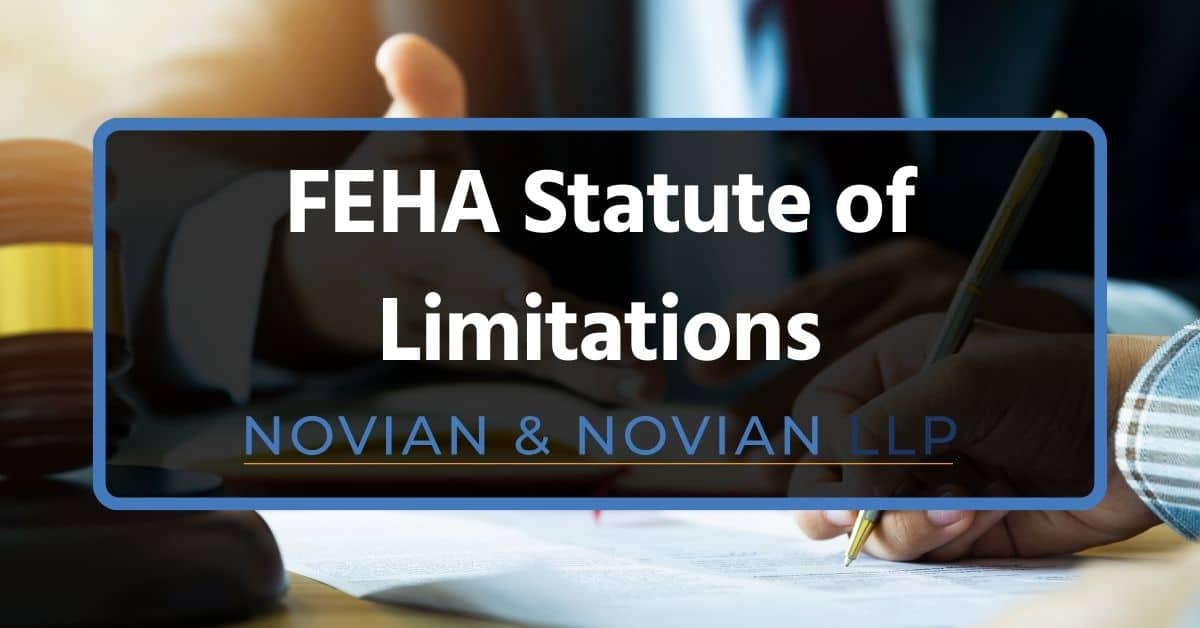
by Farhad Novian | Oct 12, 2024 | Employment Law
The FEHA (Fair Employment and Housing Act) is a California law that prohibits discrimination, harassment, and retaliation in employment and housing. Under FEHA, individuals who believe they have been harassed or discriminated against must file a complaint with the California Department of Fair Employment and Housing (DFEH) within three years for their claims to be considered.
Novian & Novian is a full-service law firm in Los Angeles, California with clients that span the country. For over 35 years, we have consistently delivered first-tier legal services, helping employers understand the various state laws including the FEHA law. If you find yourself in need of an Employment lawyer, contact us today!
This article will cover the crucial timeline for employees seeking justice and employers managing compliance. It will detail the implications of this time frame and strategies for handling FEHA claims.
What is the FEHA Statute of Limitations?
The California Fair Employment and Housing Act (FEHA) now allows individuals up to three years from the alleged violation to file their discrimination, retaliation, or harassment claims, as extended by Assembly Bill 9 (AB 9). Under this law, both employees and employers must act timely to ensure the preservation of evidence and allow for prompt investigation and resolution of claims.
Missing the FEHA statute of limitations can have serious consequences. Some of these consequences include loss of legal recourse for employees and missed opportunities for workplace improvement and resolution for employers.
FEHA Statute of Limitations in California
The California Fair Employment and Housing Act (FEHA), enforced by the California Department, serves as a robust shield against workplace discrimination, retaliation, and harassment in California. In accordance with California FEHA regulations, the policy provides protection for a wide range of categories, such as race, religion, disability, national origin, gender identity, sexual orientation, and more.
An integral part of FEHA, the statute of limitations, determines the timeline for individuals to file their claims. Currently, individuals have three years from the date of the alleged violation to file under the FEHA statute of limitations. But how does this impact employees and employers?
How Does a FEHA Statute of Limitations Work?
FEHA prohibits discrimination, harassment, and retaliation in the workplace. It also encompasses understanding one’s rights and the deadlines to exercise them.
For Employees: Protecting Your Right to Redress
For employees, filing a FEHA claim within the statute of limitations is crucial. It preserves the right to pursue legal action and ensures that the evidence is as fresh and reliable as possible. Filing a claim within the statutory period signals to the employer that the claim is serious and being pursued diligently.
For employees, comprehending FEHA regulations could provide a pathway to justice for any wrongful acts. The significance of the FEHA statute of limitations is immense. It’s the ticking clock that determines how long they have to file a claim after an alleged discriminatory act.
For Employers: Ensuring Compliance and Preparedness
For employers, understanding FEHA timelines is equally important. Timely awareness of a claim allows employers to address the issue more effectively, investigate promptly, take necessary actions, and plan for potential legal proceedings.
Ultimately, an employer’s responsiveness to FEHA claims can impact their reputation and how they are perceived as ethical and law-abiding.
These regulations aid in cultivating a compliant and inclusive workplace while facilitating a timely and fitting response to claims. It’s the timeline that governs how they manage and respond to claims, ensuring they uphold their legal obligations.
The Consequences of Missing the FEHA Statute of Limitations Deadline
Missing the FEHA statute of limitations deadline can have significant repercussions. For employees, it can result in a loss of the opportunity to seek justice. For employers, it can lead to missed opportunities for internal issue resolution and potential escalation to litigation.
But let’s examine each scenario in more detail.
For Employees: Losing the Right to Legal Recourse
When an employee misses the FEHA filing deadline, they risk losing the eligibility to file a discrimination claim. This can limit their legal options significantly.
Although other legal routes such as federal claims might be available after the FEHA deadline, they bring their own set of limitations and hurdles.
For Employers: A Missed Opportunity for Resolution
For employers, a missed FEHA deadline can present a missed opportunity for resolution. Without a formal FEHA claims process, employers may miss the chance to identify and rectify discriminatory practices, address employee concerns and grievances, improve workplace culture and diversity, and prevent future claims and legal disputes.
It is important for employers to understand and comply with FEHA deadlines to ensure a fair and inclusive work environment.
Even if a claim is barred due to a missed deadline, the underlying issues can still affect employee morale and trust in the organization.
Legal and Financial Implications
Missing the FEHA statute of limitations deadline also brings about legal and financial implications. For employees, it can result in the inability to pursue legal action. For employers, it can lead to costly and time-consuming litigation, not to mention the potential impact on their reputation.
Assembly Bill 9: Extending the FEHA Statute of Limitations
In an effort to provide more time for victims of harassment, including sexual harassment and discrimination, to comprehend their situation and seek legal recourse, Assembly Bill 9 (AB 9), also known as the Stop Harassment and Reporting Extension (SHARE) Act, was introduced. This California statute extends the FEHA statute of limitations to three years from the occurrence of the discrimination, retaliation, or harassment.
What prompted this extension, and what potential criticisms does it face?
Reasons for the Extension
The extension of the FEHA statute of limitations through AB 9 was primarily designed to provide protection for #MeToo litigants. However, it has been extended to cover all types of discrimination, harassment, and retaliation prohibited by FEHA.
While the initial timeframe was one year, AB 9 extends this to three years.
Potential Criticisms and Concerns
Although extending the FEHA statute of limitations through AB 9 allows victims of harassment and discrimination more time to seek legal recourse, it isn’t exempt from criticisms and concerns. These include the management of outdated claims, potential deterioration of evidence, fading recollections of incidents, and increased challenges for employers in addressing claims stemming from much earlier events.
How to Navigate the Statute of Limitations for Employment Claims in California
Filing a claim under the FEHA involves a clear understanding of the procedures, documentation, and the role of the Department of Fair Employment and Housing (DFEH). At Novian & Novian, we understand that a cohesive personnel force is the key to keeping your business running smoothly. Backed by more than 30 years of experience, our firm provides strong, effective representation to employers and management teams in a wide variety of fair employment law matters.
For Employees: How to File a Discrimination Claim
The process for employees aiming to file a discrimination claim involves a series of crucial steps. These include:
- Understanding what constitutes discrimination under FEHA
- Keeping a detailed record of the discriminatory acts
- Checking if your employer has an internal complaint process
- Contacting the DFEH if internal resolution is not possible or effective.
- Consider a right-to-sue letter
For Employers: Responding to a FEHA Claim
For employers, a FEHA claims response encompasses:
- Acknowledging the claim’s receipt
- Undertaking an internal investigation
- Consulting an employment law specialist attorney
- Promptly responding to any DFEH inquiries and information requests
- Safeguarding against retaliatory actions towards the claim-filing employee
- Participating in the resolution process.
Documentation and Information Requirements
Regardless of being an employee or employer, the documentation and information needed to file or respond to a FEHA claims are essential. This includes preparing all relevant documents such as emails, messages, witness statements, and any records of discrimination or retaliation claims for employees.
For employers, it means gathering all pertinent documentation like employment records, internal complaint procedures, correspondence with the employee, and any relevant witness statements.
Role of the Department of Fair Employment and Housing (DFEH)
The DFEH plays a pivotal role in the FEHA claims process. It is responsible for investigating discrimination claims, gathering evidence, interviewing witnesses, and offering mediation services to both parties as a way to resolve the dispute without going to court.
If a violation is found and a settlement is not reached, the DFEH can file an administrative complaint on behalf of the complainant, potentially leading to a civil lawsuit.
Filing a Claim with the DFEH
Filing a FEHA claim with the DFEH starts with submitting a complaint/right-to-sue letter. Then, you have to provide all the necessary details and documentation related to the discrimination. You also have to cooperate with any DFEH investigations and provide additional information as needed.
At the conclusion of the DFEH investigation process, the agency will issue a right to sue letter if the matter has not been resolved. When you move forward with a DFEH investigation, the three-year statute of limitations will not start until after DFEH issues its right to sue letter.
The process of issuing a right to sue letter will not be changed by AB 9. After receiving the right to sue letter, an employee has 1 year to file her/his lawsuit. AB 9 extends the amount of time that person has to initially file a charge with the DFEH from 1 year to 3 years after the alleged unlawful conduct occurred.
Compensation Available for FEHA Violations
In cases of successful FEHA claims, your employee may be entitled to various forms of compensation, including reinstatement to their positions and back pay for lost wages. They may also be entitled to remuneration for emotional suffering and punitive damages.
Reinstatement and Back Pay
One of the forms of compensation in a successful FEHA claim is reinstatement. This involves reinstating an employee to their previous position or job following wrongful termination. In cases involving wrongful termination claims, back pay is also calculated by assessing the total salary and additional forms of compensation, such as bonuses, vacation leave, healthcare costs, and pension payments that the employee would have received if they had not experienced discrimination.
Emotional Distress and Punitive Damages
In addition to reinstatement and back pay, employees may also be compensated for emotional distress and punitive damages. Emotional distress compensation is determined based on the severity and impact of the emotional distress experienced by the victim.
On the other hand, punitive damages may be awarded if the employer is found to have engaged in despicable conduct or violations implying intentional harm.
Strategies for Dealing with a FEHA Claim
Whether you’re an employee lodging a FEHA claim or an employer addressing one, certain strategies can be employed to fortify your case. These include acting quickly, documenting evidence, and consulting with an experienced employment law attorney.
Acting Quickly: for Employers and Individuals
Acting quickly is one of the most effective strategies for fortifying a FEHA claim. This helps preserve evidence, uphold legal standing, and ensure a swift resolution. Whether you’re an employee or an employer, taking immediate action can significantly impact the outcome of the case.
Documenting Evidence
Documenting evidence is another vital strategy for strengthening a FEHA claim. Both employees and employers should gather any relevant documents, statements, or records related to the claim. This helps in substantiating any discriminatory or retaliatory actions and can be used as evidence in legal proceedings.
Consult Novian and Novian on FEHA Statute of Limitations
In conclusion, understanding the California FEHA statute of limitations, the consequences of missing the deadline, and the strategies to strengthen a FEHA claim is crucial for both employees and employers in California. By acting quickly, documenting evidence, and seeking legal advice, both parties can navigate the claim process effectively and ensure a fair resolution.
Seeking advice from a Los Angeles employment law attorney can provide immense value in bolstering a FEHA claim. An attorney can provide legal guidance on adherence to regulations, aid in investigations and response to claims, represent your company in negotiations and settlement, and defend litigation if required.
Frequently Asked Questions
What is the FEHA statute?
The FEHA statute, or the Fair Employment and Housing Act, prohibits harassment and discrimination in employment based on protected categories, protecting employees in California. It covers a wide range of fair employment-related issues and applies to all employers with a minimum of five employees.
When did the FEHA statute of limitations change?
The FEHA statute of limitations changed on January 1, 2020, extending the time for employees to file a charge of discrimination to three years from the date of the discrimination, retaliation, or harassment.
What is the statute of limitations for wrongful termination in California?
In California, the statute of limitations for wrongful termination is two years from the date of the termination. It is the official deadline for taking legal action.
What specific categories are safeguarded under FEHA?
The specific categories safeguarded under FEHA include race, religion, disability, medical condition, genetic information, marital status, gender, age, sexual orientation, and military and veteran status. These are protected against discrimination in employment and housing.
What are the consequences of missing the FEHA claim filing deadline?
Missing the FEHA claim filing deadline could result in losing your right to seek legal recourse and forfeiting the opportunity to pursue compensation for workplace discrimination or harassment. Avoid missing the deadline to protect your legal rights.
Contact Us
Have questions about this post? Novian & Novian is a full service law firm in Los Angeles with clients that span the country. Contact us today for a free consultation.
Contact Us
Have questions about this post? Novian & Novian is a full service law firm in Los Angeles with clients that span the country. Contact us today for a free consultation.



